Camping with your kids while maintaining some semblance of hygiene may seem like an impossible feat, but it can be done. Depending on the length of your camping trip, it might not even cross your mind to bring along something as simple as soap. Today, we are going to go over some tips for staying clean while camping with the family.
It’s Camping, Why Worry About Cleanliness?
It’s understood that most of us campers go camping to experience nature and to do different things than we get to at home. Still, by day three of frolicking in the wilderness, you might become leery of hugging your kids for fear of knocking them out with your—aroma.
There are multiple reasons for staying somewhat clean while camping. Being outside, in general, tends to get you and the kids dirty pretty quickly. You’re going to be cooking, eating, and sitting around campfires. Heck, you may even be cleaning small game or fish.
Not only is the dirt, eau de smoke, and raw food you’ve been exposed to smelly, but they are also full of bacteria. A simple scratch near your eye without washing your hands and hello, pink eye, or worse. Additionally, if you’re reeking of dead fish with a touch of body odor on the side, you might not even be allowed to sleep in the tent with everyone.
So, How do you Stay Clean While Camping?
As we’ve alluded to, some dirt is expected while camping. That’s perfectly okay. On one hand, you must embrace the dirt and not worry about every single mess. On the other hand, keeping bacteria-harboring parts of the body clean, like the groin, face, hands, and feet, is essential for maintaining your health.
The following tips will provide you with ways to keep clean while you enjoy camping with your family. Remember that you are camping and simply do not need a lot of your regular cleansing supplies. So skip the exfoliating mask this week—it will most likely only attract bugs—and enjoy your trip.
Campgrounds with Showers
Many campgrounds offer restroom facilities. This is an ideal situation if you require cleanliness to be only a short walk from your tent. You could even maintain much of the hygiene routine that you have at home. However, showers, toilets, and running water are typically unavailable if you camp in a more primitive area.
Camping Soaps
We like CampSuds. It is a multipurpose and biodegradable cleanser. This means you can wash your dishes, clothes, or hair with it, and the impact on the environment is minimal. Sure, you might not get your lustrous locks using it, but you aren’t heading out to the theater this week anyway.
It is important to note that just because these soaps are biodegradable doesn’t mean you can hop into your nearest stream, lake, or pond and suds up. These soaps can have a detrimental effect on the water and wildlife. It is always best to use these soaps, whether washing dishes, clothing, or yourself, along with a bucket or camping washbasin of water at least 200 feet from a water source and your campsite.
When finished with your soapy water, dig a hole in the ground to dump it in. This allows the soap to degrade, with the soil acting as a filter. It also keeps it away from curious wildlife. Don’t forget to fill the hole back up with dirt after you’ve finished.
Bring at Least Two Changes of Clothes
This could be modified depending on how long you will be camping. The idea is that you can wear one set of clothes while washing and drying the other set.
Wear Synthetics
Synthetic performance materials have sweat-wicking properties. This helps you to stay dry and odor-free longer than cotton clothing. If you’re really working up a sweat, cotton clothing holds your sweat weighing you down and sticking to your body.
Wearing moisture-wicking clothing will also give you more time before the stink takes over. This means the need to bathe can be extended an extra day or two.
Wet-Wipes
It took me having my first baby to realize the importance of wet wipes in my everyday life. Is there any problem they can’t solve—a freshen-up here, a clean bottom there, runny noses, boo-boos, and the list goes on?
If it isn’t obvious, using a wet wipe down under after a Number Two can leave you feeling fresh and keep bacteria from proliferating. They can also be used to cleanse the face or hands before and after meals. Maybe your plates only have a few graham cracker crumbs on them from the s’mores. Use a wet wipe!
Biodegradable camping wipes are the best option in sticking to the Leave No Trace policy of campers. We like Adventure Wipes because they are large and have a subtle scent. If space is an issue and you have access to water, you can try these Coin Tissues. They are compressed to an ultra-small size, and by adding water, they expand into a usable wipe.
Hand Sanitizing Gel, Lotion, or Spray
Hand sanitizer, in whatever method you choose, kills germs quickly, making it ideal for “hand washing” before meals. It is also useful to use after restroom breaks and to freshen up before bed. In a pinch, you can even use hand sanitizer to clean minor cuts and abrasions.
Hydrogen Peroxide
Most of us consider hydrogen peroxide to be a first-aid necessity, and it is because of its antiviral and antibacterial properties. However, hydrogen peroxide has a myriad of uses, and it’s favored by many parents because it is non-toxic and breaks down into water and oxygen.
Use up to 3% hydrogen peroxide for cleaning wounds, disinfecting hands, and as a mouthwash. You can soak a cotton swab in it and wipe it under your arms or on your feet to keep bacteria at bay. It can also be used to clean plates, utensils, and other surface areas.
Cornstarch for Greasy Hair
Fill an old salt or pepper shaker with cornstarch to sprinkle on your roots between shampoos. Cornstarch is an excellent, natural, and way cheaper replacement to dry shampoo aerosols. It absorbs excess oil from the scalp leaving your hair feeling fresh when you cannot wash your hair.
Go Swimming
Of course, this option is contingent upon the availability of a lake, river, or even the ocean near your campsite. But if you can, take a dip without the soap, of course. Just being in the water will help to wash away some odor and bacteria. The kids will love it, too. As always, do a little research if swimming is a part of your itinerary. You need to be aware of local wildlife or obstructions that could be dangerous in the water.
Let’s Camp Clean
With these simple tips, you can easily keep clean while enjoying the outdoors with the family. The best part is that most ideas are eco-friendly and safe for kids. You can also add many of these items to your pack without them taking up a lot of space. Now, go plan your next camping trip and rest assured offensive odors won’t get you kicked out of the tent.

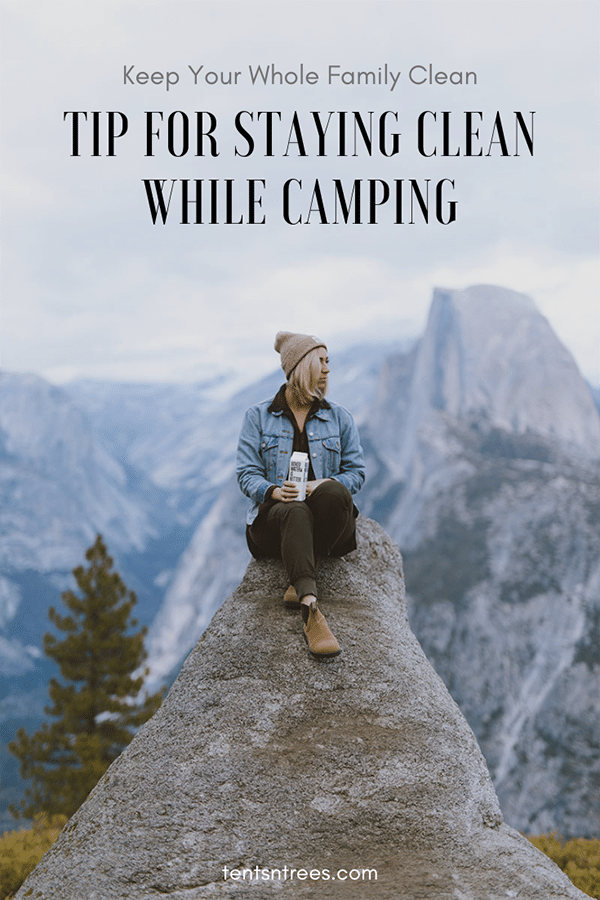
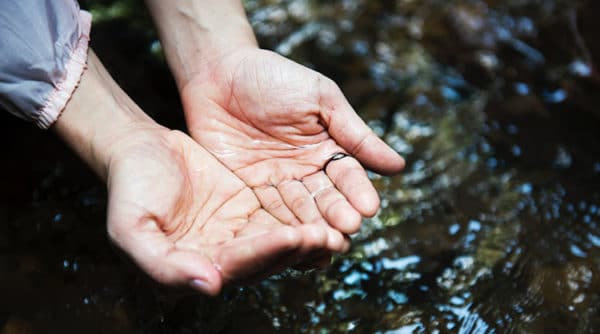
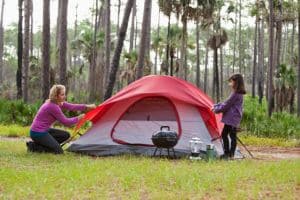
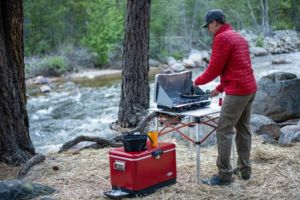
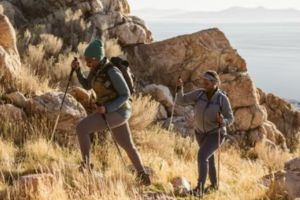
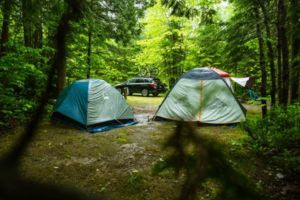
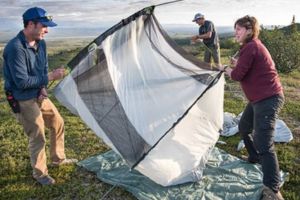
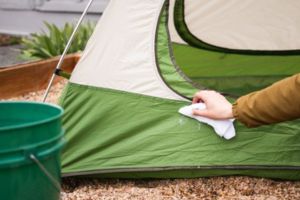
Leave A Comment